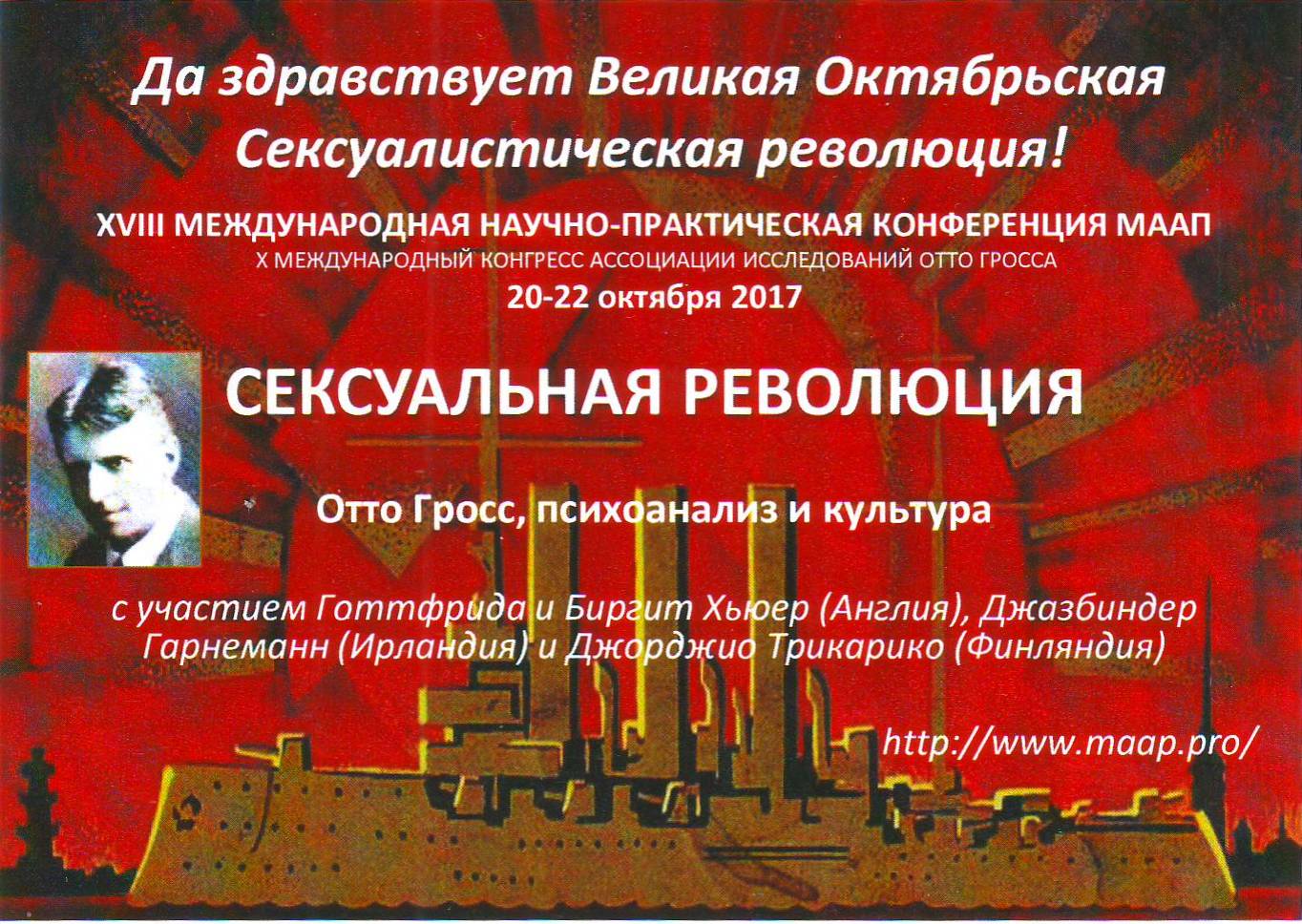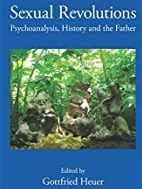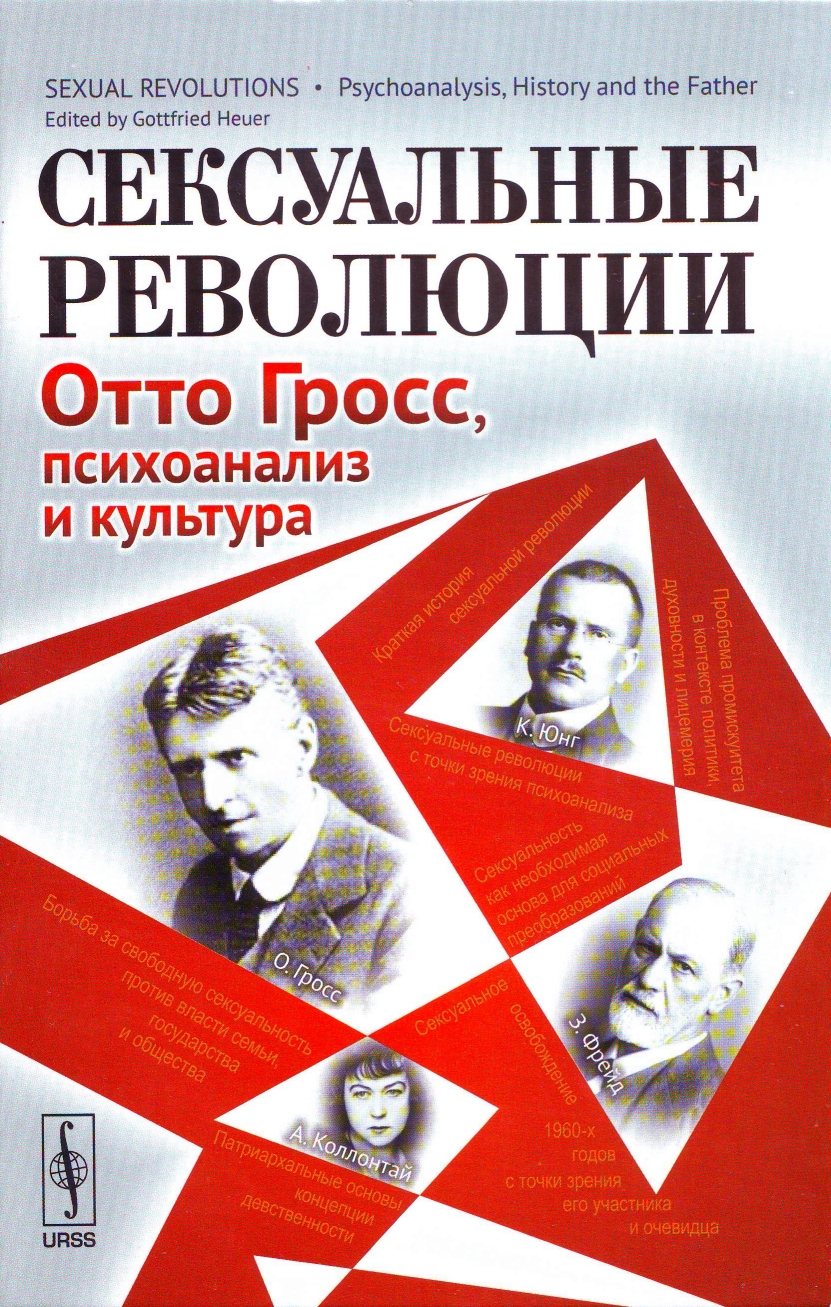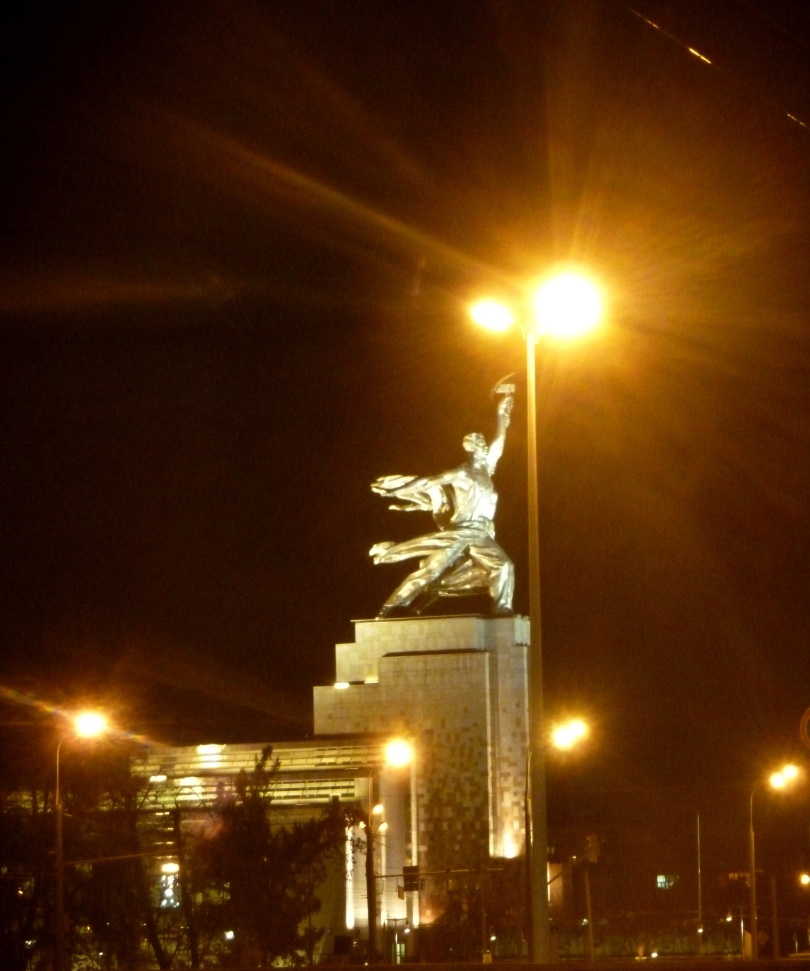

Translated, the flyer reads: The psychology of the unconscious is the philosophy of the revolution!
Sexual Revolutions
Otto Gross, Psychoanalysis and Culture
Speakers: Gottfried and Birgit Heuer (England), Jasbinder Garnermann (Ireland), and Giorgio Tricarico (Finland)
Gottfried M. Heuer
Organised by Lev Hegai, the congress coincided with the 100th anniversary of the October Revolution – hence in the background on the flyer the battleship Aurora that, in 1917, gave the starting shot 1917 in St. Petersburg. Keynote speakers were Dr. Birgit Heuer, bpf (British Psychotherapy Foundation), and Dr. Gottfried M. Heuer, AJA (Association of Jungian Analysts), London. (Garnermann and Tricario presented via Skype). Natalia Pavlikova most kindly did the translating.
For a long time, sexual liberation was a forbidden theme in Soviet Russia. For the first time in the history of post-Soviet Russia an interdisciplinary conference was devoted to the Sexual Revolution. Well-known Russian scientists – not only Jungian, Freudian and Lacanian analysts – but different specialists in history, art, philosophy, literature and religion were presenting.
Including the organisers and speakers, the three-day-congress attracted over a hundred participants from all over Russia (as far away as the Ural Mountains), as well as England, Scotland, Ireland, Finland and Germany. In addition, video-recording enabled some forty others to participate via Skype from Belarus, Germany, Kazakhstan, Moldova, the Ukraine, and the United Arab Republic. These videos are all available online. For access please contact Elena Khandurova at elena.khandurova@gmail.com
Coinciding with the congress, my book Sexual Revolutions (Routledge, 2011; see Keith Tudor’s review: Tudor, 2015) was published in Russian translation:


Here, I am giving a brief report of the congress, followed by my and my colleague Birgit Heuer’s opening addresses, my concluding words and a poem I wrote about the occasion.
In my opening address, I outlined the roots of Otto Gross’s psychology in Russian philosophy, and
Birgit Heuer spoke of the way in which her work links with Gross’s ideas and how she has developing them further and thus bringing them into the 21st century. Her main presentation, ‘The words we work with that work on us: clinical paradigm and cumulative relational trauma’, was a paper she had given earlier that year at the SAP (Society of Analytical Psychology, London) Conference in New York (Heuer, B., 2017). She also led a workshop on this subject. I gave two papers, ‘The Sacral-Sexual Revolution’ (Heuer, G. 2009), and a detailed review of the film A Dangerous Method (Heuer, G., 2012). Further presentations were: Dr. Jasbinder Garnerman, Ireland, ‘The Feminine’; Dr. Giorgio Tricarico, Italy-Finland, ‘Porn as a symbol of the current world’ (see Tricarico, 2018). Russian presenters were Dr. Nina Savchenkova, ‘Sexual Revolution in the Context of Psychoanalysis and Postmodern Philosophy’; Dr. Aiten Yuran, ‘Possible Answer of Freud and Lacan to Alain Badiou’s Assumption of Crisis of Sexuality’; Archpriest Andrew Lorgus, ‘Sexual Revolution and Orthodox Christianity’; Dr. Evgeny Zjarinov, ‘Sexual Revolution in Modern Literature’; Lidia Surina, ‘Cultural Traditions and Russian Psychoanalysis’; Oleg Telemsky, ‘Sexual revolution. Past, Present and Future’; Dr. Oksana Timofeeva, ‘We have never had Sex’; Aurelia Korotetskaya, ‘About Love. Psychoanalytic Essay’; Dr. Valery Leibin, ‘Otto Gross as Ideologist and Practicioner of Free Love’; Dr. Stanislav Raevsky, ‘New Sexual Revolution and Psychological Complex’; and Dr. Viktoria Muskvik, ‘Culturology on Sexual Revolution’. Simultaneously, parallel workshops were held at the Institute of Psychology of the Russian Academy of Sciences.
My concluding words about the healing of wounded history both in terms of so many people gathering on the subject of Otto Gross, a political and psychoanalytic revolutionary Jung and Freud tried to delete from history, as well as in terms of the most generous invitation and reception of my wife and myself in a country which, at the time I was born, had been under assault by our country, costing so many millions of Russian lives, received a standing ovation, with many of us in tears.

Worker and Kolkhoz Woman, sculpture by Vera Mukhina (1889 – 1953), Moscow;
originally created to crown the Soviet pavilion of the Paris World’s Fair, 1937.
Photo: Gottfried M. Heuer, 2017.
Opening Address
Dr. Gottfried M. Heuer, London
Ladies and gentlemen, dear guests, colleagues and friends!
It is such a great honour and privilege for both my colleague Dr Birgit Heuer and me to be here you today.! Thank you so very much, dear Lev Hegai, representing the Russian Society for Analytical Psychology, for having invited us! We are here to celebrate the life and work of Otto Gross, the psychoanalyst/-anarchist who was born 140 years ago this year, which is also the centenary of the Communist Revolution, the Ten Days that Shook the World (Reed, 1919), which meant so much for Gross.
‘To find the future, we need to unlock the past’, might stand as a motto over Birgit Heuer’s and my presentations this weekend: engaging with Otto Gross and his psychoanalytic and political influence which lasts to this day is indeed an unlocking of the past: he belongs to those aspects of our past we were never supposed to know about. For over 100 years, the psychoanalytic establishment has tried to write him out of history: earlier this year, in the renowned London Review of Books, he was still referred to as ‘the depraved opiomane Otto Gross, gesticulating on the fringes of the early movement, passed between Freud and Jung like a hot potato and unmentionable in polite psychoanalytical society’ (Keegan, 2017, p. 6). – The ancient Romans spoke of damnatio memoriae, the psychoanalyst Erich Fromm called such character assassination‘Stalinist’ (Fromm, 1989, p. 195). For me, we are looking at ‘wounded history’ (Parker, 2001) – and I consider it as our task to heal this wound. The philosopher Walter Benjamin saw the historian as ‘a prophet turned backwards’ (Benjamin, 2010: 125), implying a spiritual dimension in this healing enterprise of looking back in the present in order to create a better future. This chimes with the Russian philosopher Mikhail Epstein envisaging ‘the re-birth of utopia after its own death, after its subjection to postmodernism's severe scepticism, relativism and its anti-utopian consciousness’ (Epstein 1997). Although Birgit and I are both engaged in this, in my work, I put greater emphasis on exploring the influence of the past on the present, of course, with a view to the future, whereas Birgit is even more forward-looking towards healing as a clinical issue with a particular emphasis on language.
Over 20 years ago, Alexander Etkind entitled his History of Psychoanalysis in Russia, Eros of the Impossible (Etkind, 1997 [1995]). How appropriately, then, to engage this weekend with the Sexual Revolution ¾ and the psychoanalyst who is said to have coined the term, Otto Gross (Werfel, 1990, p. 349). Of course, with both Gross and Jung, we understand sexuality as embracing the whole range from sex, Eros, to any kind of relating, including a spiritual dimension.
Gross brought revolutionary politics into psychoanalysis, and psychoanalysis into revolutionary politics. He was the first to conceive of what today we express as ‘the personal is the political’. He was also a feminist, stating, ‘The coming revolution is a revolution for matriarchy’ (Gross, 1913, p. 80), and he was the first analyst not to pathologise homosexuality. Also, in contrast to both Freud and Jung, there are no known statements from Gross which today can be seen as racist (Heuer & Chadwick, 2017). Yet his major contributions to our daily clinical practice are in the area of what we now call object relations: ‘“Relationship” was the central focus of his teachings for renewing the world’ (Werfel, 1990, p. 347), one of his friends wrote. Gross inspired C.G. Jung’s transference diagram (Heuer, G. 2017, pp. 97 – 100), and his work marks the birth of what today we call intersubjectivity. Yet, the origin of Gross’s relational revolution lie – in Russia! Thus, celebrating his life and work in Moscow also means bringing Gross back to his roots.
Key terms in Gross’s theoretical considerations are ‘das Eigene und das Fremde’ [that which is one’s own and that which the other’s], today we’d speak of ‘self and other’. Gross’s terms were first used by the Russian philosopher Afrikan Aleksandrovich Špir (1837 – 1890). (Synchronistically in terms of Gross’s link to Špir, the latter complained of a wall or conspiracy of silence [das Totschweigen]; Bréhier 1948, p. 52.) Špir also influenced Tolstoy, who wrote in his journal in May 1896, ‘I am reading Špir all the time, and the reading provokes a mass of thoughts’ (in Anon., 2018). ‘At the [previous] turn of the century, Tolstoy became the most important inspirator of anarcho-pacifist and Christian-anarchist communities’ (Linse in Müller, 1999 p. 5). Thus both Špir’s and Tolstoy’s ideas had a huge impact on the Swiss village of Ascona, then the countercultural capital of the world: already in 1870’s, at the end of his live, Mikhail Bakunin had lived in nearby Locarno (Broggini, 1978, p. 23 – 24). Apparently, in 1904 Lenin had been in Ascona (Müller 2017). One internet site claims that there he ‘had been part of the Satanist project [. . .], where he was famous for his ecstatic dances’ (Williams, 2006); another speaks of ‘a merry colony of young people living in caves, among them Lenin, Trotsky, and Chaliapin, mainly artists’ (Müller, J., 1912, in Schaffer 2005, p. 104; in Müller, H., 2017a). Yet another source states that even ‘Josef Stalin was rumoured to have contemplated a visit’ (Török, 2007, p. 191).
It is known and documented, that in Ascona Gross’s anti-authoritarian rebelliousness received a political framework of anarchist thought, when, in 1905, he met there the German anarchists Erich Mühsam (1878 - 1934) and his partner, Johannes Nohl (1882 – 1963; see Heuer, G., 2009). (Later, Mühsam was the first to proclaim the Bavarian Soviet Republic in Munich in 1919. He was murdered by the Nazis in one of the first concentration camps. Nohl, having received his training analysis from Gross, became an analyst in his own right, and was praised by Freud. In 1919, his most prominent patient was Hermann Hesse [Heuer, 2006; 2017, pp. 140 – 145]).
Most importantly, Mühsam and Nohl introduced Gross to the anarchist philosophy of Pyotr Alexeyevich Kropotkin (1942 – 1921). By transferring Kropotkin’s core concept of Mutual Aid (Kropotkin, 1902), the mutual relating of equals, into the consulting room, Gross revolutionised Freud’s initial medical model of a hierarchical doctor/patient-relationship. Already in 1907, Gross spoke of ‘the huge shadow of Freud no longer darkening’ his ‘path’ (Gross, 1907/08, p. 212) – he never said anything negative like that about Kropotkin. The latter did spend the summer-months of the years 1908 to 1913 in Ascona (Green, 1986, p. 125). It is almost unimaginable that he and Gross did not meet during these years – yet if they did, it has left no traces in the historical records known so far . . .
In
terms of the impact of Russian culture on Gross, it is also
interesting to note that, if he mentions writers of fiction at all,
these are predominantly Russian, e.g. Dostoevsky, and the
expressionist writer Leonid Andreyev (1871 – 1919). In several
instances, Gross refers to the latter’s The
Red Laugh Andreyev,
2005) about the nightmarish sufferings of a man traumatised by war.
And,
of course, after the October Revolution, Gross speaks of Lenin, calls
his ideas a ‘revelation of the mind/spirit’ (Gross,
1919/20, p. 242) and praises Anatoly Lunacharsky, the
first Soviet People’s Commissar of Education,
for
‘his
unheard-of ingenious creative power’(Gross, 1919, p. 351).
Obviously, Gross died before the Bolsheviks’ suppression of the
sailors’ uprising in Kronstadt, and the anarchist rebellion led
by Nestor Makhno in the Ukraine. However, we might speculate about
the direction Gross’s attitude towards the Bolsheviks might
have taken, had he lived longer. Having declared in 1913, ‘I
have only mixed with anarchists and declare myself to be an
anarchist, I am a psychoanalyst and from my experience I have gained
the insight that the existing order [. . .] is a bad one. [. . . A]nd
since I want everything changed, I am an anarchist’ (in
Berze/Stelzer 1999/2000, p. 24), Gross later became a council, i.e.
Soviet communist in its literal meaning. His closest and most
long-lasting friend, the expressionist writer Franz Jung (1888
– 1963), joined the German Communist Party, and, dissatisfied
with their hierarchical order, co-founded an offshoot party. After
Gross’s death, together with some comrades, Jung hijacked a
fishing trawler in the North Sea and abducted it to Murmansk. From
there, he and his comrades reached Moscow, where they discussed
politics with Lenin, who saw Jung’s group as representing a
threat to communism the way he understood it, resulting in his 1920
pamphlet Left-Wing’
Communism: An Infantile Disorder (Lenin,
1920).
Jung’s – and Gross’s – political attitude may be summed up by Gross writing already in 1913,
None of the revolutions in the course of history succeeded in establishing freedom for the individual. They all fell flat, each the forerunner of a new bourgeoisie; they ended in a hurried desire to conform to general norms. They all failed because the revolutionary of yesterday carried within himself the authority [. . .] that puts any individuality in chains (Gross, 1913, p. 386).
This is where Gross saw the task of psychoanalysis as preparatory work for a true revolution: only working towards inner change simultaneously with external, political activism could bring about the desired transformation. In 1919 he proclaimed ‘the highest and true goal of revolutions’ the replacing ‘the will to power’ by ‘the will to relating’ (Gross, 1919, p. 355). Resurfacing decades later as ‘Make Love, Not War!’, this, in particular is another one of Gross’s lasting legacies in terms of relating in any context – interpersonally in both personal as well as therapeutic relationships, as well as collectively and politically; of course, this applies to intrapersonal relating, too, ‘between me and myself’, as it were. This is a task still awaiting its fulfilment, a challenge to all of us.
Some of the questions Gross posed continue to be burning questions today, and the answers he offered are promises yet to be fulfilled in the hopefully not too distant future.
Last, but certainly not least, I am bringing you the greetings and blessings for all of us during this congress from the daughter of Otto Gross, Sophie Templer-Kuh, who was already almost one year old at the time of the October Revolution! Aged almost 101, she lives in Berlin, where she is visited every day by her son, Anthony Templer, and is in daily e-mail-contact with her daughter, Anita Templer, in California. All three are sending their love and blessings.
Introduction to the Xth. International Otto Gross Congress, Moscow, October 2017
Birgit Heuer
I am delighted to be here and I am looking forward to sharing and discussing my ideas with you.
Since 2001, I have been developing my thoughts on a clinical approach which I call sanatology. By this I mean clinical work that is specifically oriented towards healing. After publishing a number of papers on it, I wrote a Doctoral Thesis on this theme (Heuer, B., 2015). I have brought along a copy of my thesis as a gift for you.
My connection with Otto Gross has two aspects:
Firstly, sanatology is based in an in-depth critique of mainstream clinical work. Otto Gross’ ideas, which Gottfried will tell you all about, similarly challenged the psychoanalytic approach of his time which had tragic results for him. He was excluded from the psychoanalytic association and, in addition suffered a damnatio memoriae, the extinguishing of a person’s memory and their place in history.
In my thesis, I did textual and narrative analysis of clinical case studies. For his purpose I looked at some typical examples of clinical language and reflected on their connotations and implications. The results were used to build up a picture of the underlying and implicit world-view of mainstream clinical work, which I call mainstream clinical paradigm.
This underlying outlook is problematic as, in essence, it is informed by negative ideas about the world we live in. It is, however, very similar to the outlook of the typical patient in psychotherapy. Thus mainstream clinical paradigm fails to offer a perspective that is sufficiently alternative to that of its patients. If we do not offer a different perspective or world-view from that held by our patients, it is difficult to imagine how we may effect healing, although of course it happens regardless.
Sanatology tries to remedy this situation by offering a different world-view, which I call deep positivity. Interestingly, this world view can currently be argued by employing empirical science in the form of quantum theory. Another bit of science that can be used to argue deep positivity is complexity theory, the study of complex system and their self-generated patterns.
Coming back to Gross, I think we can say that his ideas presented too much of a challenge to the mainstream clinical paradigm of psychoanalysis at the beginning of the previous century. Although this term did not exist then, we might say that he envisaged a more relational world, as well as a world of unconditional love and greater equality. In contrast, mainstream psychoanalysis held a more negative and unequal world-view.
I think deep positivity might be a current version of Gross’s approach, which is why Gottfried has called me a ‘modern Grossian’. This, then, represents the second aspect of my overlap with Gross.
The difference between Gross and myself is that I am able to employ the ideas of critical philosophy which only emerged after the second world war, as a reaction to the totalitarian thought which had swept across Europe previously. Critical philosophy holds that any form of science – be it empirical or hermeneutic – is informed by implicit, underlying views and values.
My idea of a clinical paradigm is thus a critical philosophical tool. It helps us understand that a psychoanalytic approach is not neutral. Rather it is informed by specific values and views of the world. I believe that Gross’s argument would have been much strengthened had he had critical philosophy available in his lifetime.
The critical philosopher Thomas Kuhn wrote a seminal book called The structure of scientific revolutions (Kuhn, 1970). Here he describes exactly and minutely the dynamics within a scientific approach, when new results or original thought lead to revision and change. Kuhn explains that such changes are at first vigorously opposed, only to be assimilated later. For Gross himself, Kuhn’s insight comes too late. However, it can still be employed in retrospect to clarify what happened to Gross’s ideas from their initial violent rejection to their eventual assimilation.
I believe this also contributes to a healing of the injury to Gross and is ideas, particularly with regard to the damnatio memoriae, the removal of all traces of his work from the historiography of psychoanalysis.
Rehabilitating Gross and re-instating his work has been Gottfried’s lifelong passion. My lifelong project has been sanatology and clinical paradigm. Part of my initial motivation for this was the plight of analyst colleagues who wanted to innovate or question the mainstream clinical paradigm of our time.
In the process, it seems I am able to contribute to Gross’s retrospective rehabilitation, and for this I feel immensely grateful.
Concluding Remarks
Gottfried M. Heuer
Спасибо (thank you) is the first word I learnt to say in Russian language from Ivan Nikolaichik, who met Birgit and me at Domodedovo airport, and on the following day introduced us like a guardian angel to your beautiful city.
I want to give thanks again: Nowhere ever have we been so utterly generously welcomed and looked after throughout our stay here as by you! Спасибо (thank you) to you, dear Lev Hegai, for having invited us and for having organised this great 10th International Otto Gross Congress in conjunction with the XVIII Annual Conference of the Moscow Association for Analytical Psychology, and also, of course, for getting the translation of my book Sexual Revolution published in time for this congress!
Спасибо (thank you) to Natalia Pavlikova for having translated our presentations and for having thus given us a voice in your beautiful Russian language!
In my opening address you may have noticed how, at one moment, I was overcome with emotions: this was when I realised that you all having come together for this congress is an important step in healing wounded history – healing our collective wound from Jung, Freud and others having treated Otto Gross abusively by trying to purge him from history.
But that is not all: when I was born in December 1944 in northern Germany, our countries were at war, a war Germany had started, and that cost so many millions of Russian lives. So, your generous invitation to us as Germans is also an important step towards healing that wound, too, in our collective history. And we are both deeply grateful for that!
Bless you – and cпасибо – большое cпасибо (thank you – thank you very much)!
The Gathering of the Rebel Angels:
With Otto Gross to Moscow:
1917 – 2017 – 2117
Past – Present – Future
Gottfried Maria Heuer

Dr Birgit Heuer is a Jungian Analyst of the British Psychotherapy Foundation. She also has done a previous training in body-oriented psychotherapy. She has been in private practice for the past thirty-six years. She served on the BAP training committee and worked as clinical supervisor at Kingston University. She teaches on several Jungian-analytic trainings, as well as at Birkbeck College, University of London, and at the Centre for Psychoanalytic Studies, University of Essex. She has published numerous papers (Journal of Analytical Psychology, Self & Society, et al.) and book-chapters (Christopher & Solomon, eds., Contemporary Jungian Clinical Practice, 2003; Stein, ed., Jungian Psychoanalysis, 2010; Heuer, ed., Sacral Revolutions, 2010; et al.), and her PhD is on Sanatology, a Clinical Paradigm of Health and Healing. She also lectures internationally on themes such as ‘body and being’, ‘forgiveness’, ‘spirituality in the consulting-room’ and on ‘clinical paradigm’, having presented at the IAAP Congresses in Cambridge 2001, Barcelona 2004, Cape Town 2007, as well as the JAP Congress, New York 2017, et al.
Dr. Gottfried M. Heuer, is a Jungian Training–psychoanalyst and –supervisor, and also a Neo-Reichian body-psychotherapist with some 40 years of clinical practice in West-London; an independent scholar with more than 70 published papers, he has taught and lectured internationally in many European countries, North, Central and South America, Africa and Australia; his books include 10 congress–proceedings for the International Otto Gross Society (which he co-founded); Sacral Revolutions (Routledge, 2010), Sexual Revolutions (Routledge, 2011; Russian edition published 2017) and Freud's 'Outstanding' Colleague/Jung's 'Twin Brother'. The suppressed psychoanalytic and political significance of Otto Gross (Routledge, 2017). He is the founder (1995) and keeper of the Otto Gross Archive, London, and recently initiated the International Association for Otto Gross Studies (see https://ottogross.org where he also presents a filmed discussion about Gross @ this website, https://vimeo.com/196609212). In addition, he is a published graphic artist, photographer, sculptor and poet.
1 Percy Bysshe Shelley, The Red Mask of Anarchy.
2 Genesis 28:12.